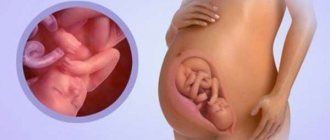It is generally accepted that heartburn can take you by surprise several months before giving birth. The fetus increases in size, which causes the child to put pressure on the walls of the stomach and internal organs. This is what provokes the burning sensation and constant feeling of pain. However, this does not always happen.
Many girls do not detect their pregnancy until the pregnancy is delayed. This opinion is erroneous, since pregnancy can be manifested not only by the presence of delay and toxicosis. In the first days of pregnancy, the above symptoms, as a rule, do not appear, but heartburn can creep up quickly and unnoticed. Can heartburn be a full-fledged sign of pregnancy?
Heartburn is a sign of pregnancy that can be viewed from different angles. This symptom occurs in every third woman who finds herself in an interesting situation. It can appear in the early stages, at the most unexpected moment, when the girl has no idea that she is already carrying a child.
Thus, bearing a child becomes a real double challenge, in which you need to endure all the difficulties of pregnancy and additionally learn how to properly deal with heartburn attacks.
Does heartburn occur in the early stages?
Answering the question whether heartburn occurs in the early stages of pregnancy, experts say that many women experience it. This may be a sign of chronic inflammation of the stomach, which was not treated when planning conception, but is most often associated with other causes.
Heartburn occurs in early pregnancy due to hormonal changes. During gestation, different endocrine structures take on a leading role. As a rule, at the 8th week of pregnancy, heartburn decreases, completely stopping by the end of the first trimester, and then begins to bother you after the 30th week.
Heartburn in early pregnancy is a fairly common occurrence.
How to properly deal with heartburn during pregnancy?
Heartburn in the early stages requires a separate approach to treatment.
She usually does not act too persistently or aggressively. But if you don’t learn to cope with its symptoms at an early stage, then it will make your pregnancy not a pleasant expectation of a miracle, but a continuous and unbearable torment. What to do if heartburn makes life unbearable already in the early stages of pregnancy? Burning must be dealt with in the following ways:
- Drink plenty of fluids throughout the day, namely alkaline non-carbonated mineral water;
- During heartburn attacks, consume a small amount of sunflower seeds, walnuts, and almonds;
- When an attack occurs, drink a glass of milk or kefir.
When heartburn appears, many girls are puzzled by how best to eliminate it and begin to look for miracle drugs and folk methods for its treatment. However, you should always remember that if a pregnant girl follows an acceptable diet and does not overeat with chocolate, flour, smoked and fried foods, then heartburn is easily eliminated. Carbonated sweet drinks should also be avoided.
Diet
Is the diet of a pregnant girl healthy and tasty at the same time? Undoubtedly. Any person can envy the nutrition of a pregnant girl, as it is rich in vitamins, nutritious and varied at the same time.
A pregnant woman's diet should be adjusted in the first weeks. Pregnancy is a crucial period in the life of every young mother, since she is responsible not only for her own health, but also for the health of the unborn person. So, in order to prevent heartburn in the early stages, it is necessary that your diet includes exclusively these products:
- Fruits (not sour);
- Vegetables;
- Dried fruits;
- Boiled meat and fish;
- Baked meat and fish dishes;
- Not sour cottage cheese;
- Berries;
- Porridge.
Avoid using:
- Alcohol;
- Coffee;
- Fried, hot and sour dishes;
- Citrus;
- Strawberry;
- Exotic fruits;
- Mayonnaise;
- Sauces (sour, hot);
- Spices and seasonings;
- Sour juices.
During heartburn, you can take special antacid medications that have no contraindications and do not cause unpleasant consequences. You should not take medications containing sodium and magnesium, as they negatively affect the development of the fetus. Even a one-time use of the drug can significantly affect the condition of the child and the well-being of the young mother.
Why do pregnant women experience heartburn?
The causes of heartburn in the first trimester of pregnancy lie in the leading role of progesterone. It is designed to act on the muscular wall of the uterus to allow the organ to grow, promotes breast enlargement, and enhances diuresis.
The hormone cannot act selectively, so it also relaxes other elastic fibers. Because of this, the sphincter of the stomach does not close completely, and digestive juice flows back into the overlying sections, causing discomfort. At 10 weeks of pregnancy, progesterone levels decrease and heartburn decreases.
The cause of the disorder in the 3rd trimester is the growing pressure of the fetus on the digestive organs. The child increases in size, the uterus stretches, pushing aside neighboring organs. Heartburn appears, especially when lying down. The use of medications has no effect, since the discomfort is caused by mechanical action.
Causes of heartburn during pregnancy?
Heartburn (or acid dyspepsia) is a burning sensation and pain behind the sternum and in the epigastric region. Most often this occurs due to the release of gastric juice into the esophagus, as a result of which the sensitive mucous membrane is irritated and this unpleasant feeling of heat occurs.
The release of this very acid is provoked by compression of the internal organs. This is why people often feel heartburn after actively bending over or pumping up their abs, as well as after being overweight. During pregnancy, the growing fetus puts pressure on the organs, which gets worse as the pregnancy progresses. That is why heartburn most often torments women, starting from the second trimester, and in the early stages they, as a rule, do not experience such “happiness” (although there are such cases).
Of course, the esophagus is protected from the effects of stomach acid by a kind of valve - the sphincter, so not everyone suffers from heartburn. But under the influence of the “pregnant” hormone progesterone, muscle tone, as we know, is relaxed, including the muscles of the esophagus. And this muscle clamp valve in this relaxed state allows stomach acid to pour into the esophagus. Tight closure of the sphincter is also prevented by an enlarged uterus and an increase in intra-abdominal pressure (approximately 25 weeks).
High levels of hormones during pregnancy also affect the time the body needs for complete digestion. The muscle contractions that help food pass through the esophagus are slowed as a side effect of hormonal secretion. As a result, the digestive process and breakdown of food takes longer, leading to indigestion and heartburn.
As a rule, heartburn begins soon after eating (especially after eating large fatty, fried and spicy foods) and can last from a few minutes to several hours on end. But everything is very individual. Many pregnant women note that they constantly experience heartburn, even if they do not eat or drink anything. And often heartburn begins to bother the expectant mother in a supine position, so she has to sleep almost sitting up.
Provoking factors
Under certain conditions, the likelihood of heartburn in the first weeks of pregnancy is increased:
- non-compliance with diet;
- chronic diseases;
- consumption of unwanted foods;
- the use of tight clothing that compresses the chest and abdomen;
- habit of eating before bed;
- hereditary predisposition;
- individual characteristics of a woman;
- the use of antispasmodics, which additionally relax the muscles.
It has been scientifically proven that heartburn is associated with a hereditary predisposition. Therefore, if a pregnant mother experienced a burning sensation in the esophagus, then the likelihood of the situation repeating in the next generation is high.
On a note! There is a theory that heartburn is caused by baby's hair tickling the mucous membrane. From this follows a popular belief that mothers with a burning sensation give birth to children with long hair. This is a myth that has no scientific evidence. The fetus is located inside the amniotic sac and does not directly contact either the mucous membrane of the uterus, or, especially, the digestive tract.
If heartburn appears at the 13th week of pregnancy, then you need to normalize your diet, since the effect of progesterone is no longer so pronounced, and the fetus is not yet large enough to cause sensations. Another cause of discomfort is overeating. To adjust your diet, you need to consult a doctor, and not try to solve the problem yourself. He will give the right recommendations, suggest an approximate menu, and point out violations and restrictions.
Drug treatment
There are medications that are safe for both the woman and the fetus in early pregnancy for heartburn. If there is a strong burning sensation in the esophagus, the doctor may prescribe antacid medications that are not absorbed in the intestines and are not transferred through the placenta to the baby. They have the following effect:
- They neutralize hydrochloric acid, as they contain calcium and magnesium in small doses.
- Reduces pressure in the stomach and duodenum.
- Reduce reflux.
- Promote the formation of mucus, which protects the digestive system from irritation by hydrochloric acid.
Antacids are antiseptics. They are usually used in combination with dietary nutrition. Pregnant women are not recommended to take medications containing aluminum, as this element accumulates in bone tissue and worsens its condition in mother and child. In addition, the use of such drugs leads to constipation.
Addition: Some folk remedies (infusion of chamomile or flaxseed, freshly squeezed potato juice and others) also help get rid of heartburn.
Symptoms
Symptoms of heartburn in the 1st trimester of pregnancy are difficult to confuse with other disorders. These are sensations of discomfort in the esophagus, a burning sensation that appears after eating 30-40 minutes or throughout the day.
Vomiting, nausea and heartburn during early pregnancy often worry a woman in combination. Not knowing about her situation, she may think that gastritis or pancreatitis has worsened, although these are already manifestations of toxicosis.
A pregnant woman notices signs of heartburn after she turns around, stands up, or lies down. The condition is accompanied by a sour taste in the mouth, a lump in the throat when swallowing food, which goes away if you drink water or other liquid.
Causes and symptoms
Heartburn is the reflux of stomach contents along with hydrochloric acid into the esophagus. This process is called reflux. Gastric juice, once in the esophagus, irritates its walls and provokes the development of an inflammatory process.
Heartburn in early pregnancy can be caused by:
- Changed hormonal levels of the expectant mother.
- A greatly increased level of progesterone, which contributes to the normal course of pregnancy and the full development of the fetus. Increased progesterone helps the uterus relax and helps eliminate the likelihood of developing tone, which often leads to spontaneous miscarriage. In addition to the effect of progesterone on the muscles of the uterus, one can note its effect on other organs.
- Due to the effect of progesterone on a woman’s body, located between the esophagus and stomach, the sphincter tone also decreases. This can trigger heartburn.
Women carrying a baby often complain of a painful burning sensation in the chest area (sometimes in the throat). Heartburn manifesting itself in this way often causes attacks of nausea and vomiting.
How to get rid of heartburn in early pregnancy?
The doctor warns that it is not recommended to suppress heartburn in the early stages of pregnancy with medications. This is explained by the fact that another disorder may be hidden under the guise of heartburn. In addition, lozenges and lozenges contain aluminum or other components that may adversely affect the course of gestation.
The problem of how to get rid of heartburn during early pregnancy should be solved along the path “from simple to complex.” This means that the doctor prescribes dietary restrictions, excludes unwanted foods, and recommends traditional methods of struggle. Only if they do not help, do they select effective and safe methods of medication.
Proper nutrition
Proper nutrition can help you avoid heartburn
If heartburn bothers you during the first trimester, you need to take care of proper nutrition during pregnancy, including in your diet such foods as:
- lean fish;
- steamed poultry fillet;
- beef;
- fresh or boiled vegetables;
- porridge (semolina, buckwheat, oatmeal, rice);
- still water;
- green tea;
- compote without sugar;
- baked apples.
Women with heartburn are advised to follow several rules:
- eat small meals;
- reduce the intervals between meals;
- exclude the above products;
- switch to dietary meat;
- do not go to bed immediately after eating;
- sleep on a high pillow;
- do not wear clothes that are tight or compress the stomach;
- use the steam cooking method, exclude fried and smoked ones;
- in the morning after waking up, do not jump up immediately;
- try not to bend over.
It is known that milk, ginger, and muesli help reduce the acidity of gastric juice, and therefore the severity of symptoms. It is best to experimentally determine the type of food that causes burning and eliminate it. This will allow you to maintain your usual diet as much as possible.
During meals, food should not be washed down immediately, especially with carbonated drinks. The amount of water should be reduced so as not to contribute to the appearance of edema and not to stretch the stomach. You need to drink the liquid in small sips.
A woman should avoid situations in which gastric juice has the opportunity to be released into the esophagus. This is a sudden jumping out of bed after waking up, going to bed after eating. Therefore, it is recommended to slowly chew a piece of cookie in the morning, and then slowly get up. During the day after eating, it is advisable to walk so that the food bolus begins to be digested.
Muesli with milk helps reduce stomach acidity
Prohibited foods for heartburn
Pregnant women often develop cravings for unhealthy or unusual foods in the first month of pregnancy. Foods that cause heartburn can be presented in the form of a list:
- spicy, pickled foods;
- spices and herbs;
- soda;
- coffee;
- sweets, baked goods;
- fermented milk food;
- sourdough bread;
- fried foods;
- sauces and marinades, ketchup;
- home and industrial seaming;
- semi-finished products;
- sour fruits.
Not all of these products cause discomfort; it may be one or more of the ingredients. Perhaps the body reacts normally to fried meat, but the sauce with which it is complemented provokes a burning sensation. If a woman smokes, she is often unable to give up the habit abruptly due to pregnancy. A cigarette increases gastric secretion, which increases the risk of gastritis, heartburn, and dyspeptic disorders.
Drugs
In order not to endure unpleasant sensations, the woman asks the doctor to tell her what medications can be taken if the disorder occurs. Medicines for heartburn during pregnancy, which can be used in the 1st trimester, are divided into categories:
- antacids;
- antisecretory;
- drugs that enhance gastrointestinal motility;
- enzymes.
The first category contains substances that help neutralize acid. To ensure action, they contain aluminum, calcium, magnesium and sodium salts. They are presented in the form of gels and suspensions, helping to cope not only with heartburn as a symptom, but also to alleviate the signs of gastritis. Modern remedies are in tablet form, so you can dissolve them in a public place without attracting attention.
Antacids are not all approved for use in pregnant women, despite their convenience. They can affect the absorption of other drugs and help for a short period of time. Antacids include: Rennie, Gastal, Almagel, Maalox.
The next category copes with the symptoms of the disorder by reducing the secretion of gastric juice. The drugs act in two ways: by blocking the transport of protons necessary for acid synthesis. Among the well-known representatives are Omeprazole, Pantoprazole. The second group of drugs blocks stomach receptors (ranitidine).
If you speed up the passage of the food bolus through the digestive tract, it will come into less contact with hydrochloric acid. Such drugs that enhance intestinal motility include Motilium, Cerucal. They also reduce bloating and stomach pain. Not all medications from this group can be used during pregnancy, especially in the first weeks of gestation.
To break down each group of substances (proteins, fats, carbohydrates), the digestive glands produce their own enzymes. To speed up the digestion process, they can be delivered to the stomach from the outside. Enzymes are safer for the expectant mother, so they are prescribed more often (Mezim, Festal).
It is known that long-term use of anti-burning remedies causes adaptation of the digestive system. Therefore, it is recommended to change medications every 2 weeks.
Important! Baking soda, which is considered a universal remedy for heartburn, helps with an ultra-short effect, relieving symptoms for 10-15 minutes. The peculiarities of its action are such that after the end of the effect there is an excess release of acid into the stomach. Therefore, this old method of dealing with discomfort is not recommended.
Using baking soda to treat heartburn is not recommended.
Folk remedies
In pregnant women in the early stages, folk remedies for heartburn can be used. They should be prescribed by a doctor because herbs or other methods may increase uterine tone.
Here are some ways to cope with discomfort:
- outside meals, drink 250 ml of warm milk;
- eat oatmeal;
- soak buckwheat or peas in water for several hours and eat;
- drink sweet and sour fruit jelly;
- prepare a drink from ginger root;
- squeeze juice from potatoes and carrots and drink before lunch;
- take a drink from calamus rhizome internally;
- use herbal decoctions (St. John's wort, chamomile, gentian, yarrow, dill).
The approach to the use of folk methods is individual: one method will help someone, another will help someone. They are not universal, that is, they require practical selection.
Taking a herbal decoction will help cope with heartburn
How to sleep properly?
To prevent gastric juice from flowing back, you need to ensure the correct position of the body during sleep. The requirements are simple: compression of the stomach and low position of the head should not be allowed. Therefore, the best sleeping position is on your back, with the head of the bed raised.
Important! These recommendations apply in early pregnancy. Then the uterus begins to put pressure on adjacent organs, disrupting blood flow in the aorta. Then it is better to move the body to the right side. For a comfortable position for a pregnant woman, there are special pillows on sale.
The right clothes
Wearing the right clothes does not help get rid of heartburn, but it also does not contribute to its appearance. A woman should pay attention to the fact that skirts with elastic waistbands, fitted and tight trousers put pressure on the stomach, contributing to discomfort. It is recommended to use loose clothing: tunics, dresses. There is a wide range of items for pregnant women on sale. They feature a high waist with soft elastic that covers the belly.
Thus, heartburn in early pregnancy appears due to hormonal changes in the body. Its onset may hint to a woman about an interesting situation even before the cycle is delayed. To cope with discomfort, you need to reconsider your diet, choose suitable clothing, follow a few rules, or, as a last resort, use medications.
Preventing heartburn while pregnant
Heartburn in the early stages requires special preventive measures that will help eliminate it completely and make bearing a child a pleasant and joyful event.
- Avoid eating foods that cause burning;
- After eating, do not lie down or bend over for the first 30 minutes;
- Eat often and in small portions. After each meal, a pregnant woman should remain a little hungry;
- When sleeping, do not lie horizontally; your head should always be elevated. It is not necessary to change the bed; you can put a couple of pillows under your head;
- No need to sleep on your back;
- It’s worth reconsidering your wardrobe and putting aside fashionable skinny blouses and jeans for a while. You should give preference to loose and light outfits.
It does not matter at what time heartburn begins. The methods of combating and eliminating it are the same for each case - this is a diet and the right image. However, if all of the above tips and methods do not give any result, then this is a reason to visit your doctor, who will help eliminate the possibility of inflammation of the stomach walls or other intestinal disease.
Can heartburn be a sign of pregnancy before a missed period?
Heartburn as a sign of pregnancy, detected before the delay, should be perceived only secondarily. Initially, the symptom indicates problems with the gastrointestinal tract. These are gastritis (inflammation of the walls of the stomach), ulcers, dyspepsia, hiatal hernia and other pathologies. They are accompanied by flatulence, burning behind the sternum, belching and increased salivation.
Heartburn in the early stages of pregnancy, if the woman does not have health problems or diseases of the gastrointestinal tract, may be present until the delay. But the expectant mother can note its appearance only a week after fertilization. During this period, the fetus manages to penetrate from the ovary through the fallopian tube into the uterine cavity and attach to one of the walls. From this moment, pregnancy is considered to have begun, and signs of hormonal changes appear more and more pronounced. Therefore, women who are attentive to their health, keep a monthly calendar and want pregnancy, even based on such a sign as heartburn, can guess about conception.
Other signs of pregnancy
Heartburn in the early stages does not necessarily always indicate conception; other early signs of pregnancy must also be taken into account. Doctors include:
- changes in taste perception, the appearance of belching and feelings of nausea;
- increased production of saliva, which is why the woman constantly swallows it, and the process is accompanied by a feeling of fullness in the stomach (provoked by swallowing air along with saliva);
- manifestation of the vascular network on the skin due to the expansion of capillaries;
- increased heart rate due to increased load on the organ while the body adapts to bearing a fetus;
- feeling of drowsiness and weakness due to hormonal changes that accompany the first signs of pregnancy;
- pulling pain in the lower abdomen of the menstrual type, indicating increased production of prolactin (a hormone that controls milk production in the glands);
- headaches and fatigue.
Signs of pregnancy
On a note! Vomiting may be an early sign of pregnancy. A woman’s figure changes, her breasts increase in volume and swell due to increased secretion of prolactin. When you touch the glands, pain is often detected, but it will go away after the hormonal levels stabilize.
Why does heartburn occur during pregnancy?
Heartburn begins when the acidic contents of the stomach (in medicine it is called refluxate) enters the esophagus and its mucous membrane is irritated, in fact, it receives a chemical burn. This happens in healthy people, but it is especially difficult for pregnant women: after all, the high content of the hormone progesterone, which relaxes the muscles of the uterus so that it does not begin to contract and cause premature birth, also affects other smooth muscles, including the sphincter, whose main the task is to separate the stomach from the esophagus, and on the walls of the stomach, which in a normal situation are supposed to contract intensively, returning refluxate back to the stomach1,2. In addition, the esophagus is already irritated by frequent vomiting caused by toxicosis in the early stages of pregnancy. And the growth of the uterus affects the surrounding organs, including the stomach and esophagus: gradually they become more and more crowded, it is not without reason that symptoms of heartburn begin to appear, as a rule, after the 20th week, when the fetus is fully formed and has grown to about 25 cm.











